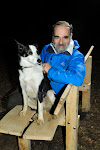Erev Yom Kippur 5769
This is just a short but heartfelt message. The Shulchan Aruch (Orach Chayyim 581:1) discusses the characteristics necessary in a shaliach tzibbur (you’ll be surprised to know that it fails to use gender neutral language). Among the qualities listed, it is noted that he (or she) should ideally be at least thirty years old. (Please don’t feel bad if you aren’t! Nowadays these are seen are as hypothetical ideals anyway and it’s wonderful for our community to have new shelichei /ot tzibbur who are young.) The Mishnah Berurah notes that the reason is that a Levite of this age was fit to serve in the Temple, and that prayer, avodah she’balev, corresponds to avodah, the Temple service. But the Sha’ar Hatziyyun observes that the reason given in the Darkei Moshe is different. The latter writes, ‘Ideally he should be over thirty years of age, because then his heart is broken and crushed’.
This hardly sounds like a recommendation. But the words ‘broken and crushed’, nishbar venidkei, are not to be read negatively. The contexts from which these adjectives are drawn come from the Psalms: ‘God is near to the broken hearted’ (Psalm 34:19), and ‘The sacrifices of God are a broken spirit and a broken and crushed heart; these God will not reject’ (Psalm 51:19). But perhaps the best illustration is to be drawn, of course, from Hasidic life. Rabbi Abraham Joshua Heschel’s ancestor, the Apter Rav, was once asked why his prayers were always accepted in heaven. He replied: ‘You see, whenever a Jew comes to see me and pours out his heart and tells me the story of his misery and suffering, I have such compassion that a little hole is created in my heart. Since I have heard and listened to a great many Jews with their problems and anguish, there are a great many holes in my heart. I’m an old Jew and when I start to pray I take my heart and place it before God. He sees my broken heart, so many holes, so many splits, so He has compassion for my heart and that is why He listens to me.’
This reminds me of one of my favourite verses in the entire Torah: ‘And the Lord your God will open your heart and the hearts of your children, to love the Lord your God with all your heart and with all your soul, so that you may live’. (Devarim 30:6) May God open our hearts and give us a compassionate spirit, so that the hopes, longings and yearnings of all our congregation and of human hearts everywhere may flow through us, and give wings to our words and our music so that they descend deep into our souls and ascend up to heaven. May God open our hearts and guide us and teach us to be compassionate in all our deeds in the coming year and for the rest of our lives.
Gmar Chatimah Tovah
Wednesday, October 8, 2008
Subscribe to:
Post Comments (Atom)

No comments:
Post a Comment